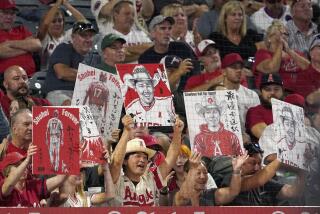Big-Spending Angels Hit With Luxury Tax
Garret Anderson’s contract extension just cost the Angels another million dollars.
After the Angels spent $146 million on free agents last winter, they committed another $48 million to the star outfielder last spring. That officially tipped the Angels into the category of big spenders, joining the New York Yankees and World Series champion Boston Red Sox as the only major league teams subject to a luxury tax for the 2004 season.
The Angels were assessed a $927,000 tax bill this month, according to documents obtained by Associated Press. The Yankees were billed $25 million and the Red Sox $3 million.
“We didn’t really plan to be in this position a year ago,” Angel General Manager Bill Stoneman said Monday.
Under the collective bargaining agreement, teams with player payrolls above $120.5 million last season were assessed a tax on the amount over the threshold. The Angels’ tax bill was based on a payroll of $125 million.
The luxury tax accounting includes salaries and benefits for the 40-man roster, not just the 25-man major league roster. Although Anderson’s salary last season was $6.2 million, the tax liability was based on average annual value of his contract, including the four-year extension signed in April.
That $11-million figure followed the $14-million average for free-agent outfielder Vladimir Guerrero, signed last January, and $12.75 million for free-agent pitcher Bartolo Colon, signed last December. The Angels later added outfielder Raul Mondesi for $1.75 million -- some of which went unpaid after his suspension and release -- and paid major league salaries to minor league callups necessitated by injuries. But Stoneman said Anderson’s long-promised extension was the major factor in making the team a taxpayer.
“That was the one that really put us over the hump,” Stoneman said.
The bill is relatively small, considering owner Arte Moreno has said he lost about $25 million last season.
But, with the tax threshold jumping to $128 million next season and the Angel payroll expected to fall below $100 million, the team does not anticipate liability next season.
“We’re not budgeting a luxury tax payment,” Stoneman said. “The threshold is going up and our payroll is going down.”
As first-time taxpayers, the Angels and Red Sox were charged 22.5% of the payroll over the threshold. As second-time taxpayers, the Yankees were charged at a 30% rate. For tax purposes, the Yankee payroll last season was $204 million and the Red Sox $135 million.
The luxury tax expires after the 2006 season, along with the collective bargaining agreement. The owners believe the tax restrains spending on players, but it cannot be renewed without approval of the players’ union.
More to Read
Go beyond the scoreboard
Get the latest on L.A.'s teams in the daily Sports Report newsletter.
You may occasionally receive promotional content from the Los Angeles Times.






